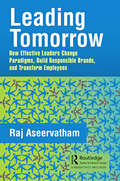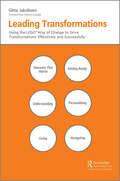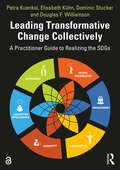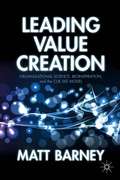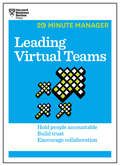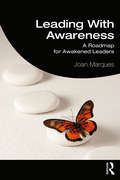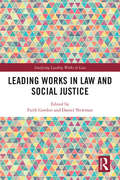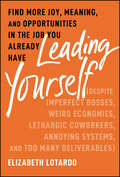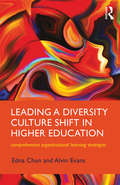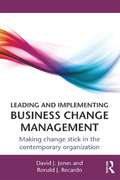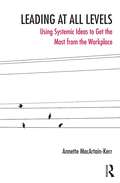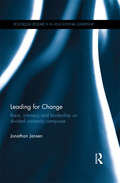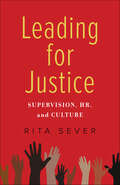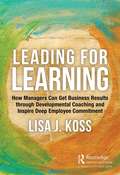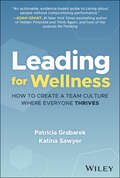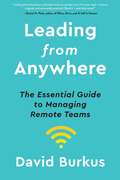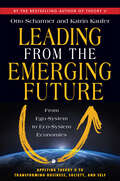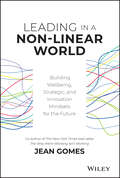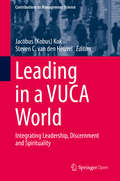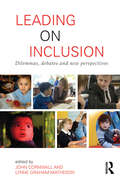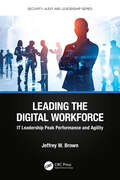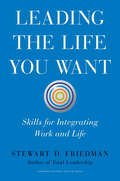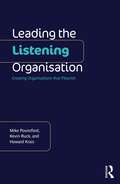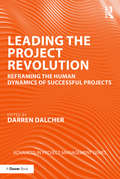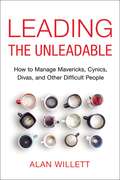- Table View
- List View
Leading Tomorrow: How Effective Leaders Change Paradigms, Build Responsible Brands, and Transform Employees
by Raj AseervathamMaintaining good business leadership in a world of rapidly changing expectations levied by customers, investors, society, governments and employees is a challenge. These stakeholders are increasingly making choices about if or how they support businesses – through the purchase of their products and services, shareholdings and financing, regulatory approvals, and even experiences working for them – based on not just what a business does, but how it does it. We are seeing shifts in stakeholder sentiments that manifest in a greater expectation that businesses work with society in addressing society’s contemporary concerns. This greater good that businesses bring is rewarded by a greater brand awareness, connection and loyalty, which in turn provides businesses with an underlying strategic advantage over the competition with its customers, investors and other stakeholders. But this greater good cannot be faked with PR and bought media; in an increasingly connected world populated by an increasingly savvy millennial stakeholder base, authentic leadership and its ability to effect cultural shifts in the DNA of businesses is essential. Failure to do so will likely result in shorter and less successful tenures of Board members and C-suite leaders as this business trend spreads. This book looks at how the emerging generation of leaders must change paradigms and transform their employees to do more than just operate a business. It examines how to effect culture shifts that are necessary to innovate businesses so that they simultaneously meet market needs while meeting stakeholder expectations on concerns as varied as ethical business conduct, labor practices, climate change, responsible use of diminishing natural resources and contribution to socio-economic challenges in their market catchments. These are perspectives and skills that are still glossed over, by academic and professional institutions, as they develop the leaders of the future. Essentially, this book: • Articulates the strategic business case for doing good in a good business; the why, and where this trajectory is leading • Provides strategies to lead authentically on the array of issues that provide key stakeholders – customers, investors, governments and employees – with a greater reason to engage with and build loyalty to the business • Provides strategies to energize and spark innovation among his/her employees in an organization on these issues so that transformative power is harnessed.
Leading Transformations: Using the LEGO® Way of Change to Drive Transformations Effectively and Successfully
by Gitte JakobsenThe world and its business environments are in a state of constant change. The reality today is that organizations and their leaders are faced with increasingly daunting demands for change and, unless they build organizations that can keep pace with these fast-changing environments, it will be a challenge simply to survive while, at the same time, continuing to thrive and embrace uncertainty and disorder. One effective example of a world-renowned company that survived an existential crisis to become one of the most iconic companies in the world: The LEGO Group. In Building a Global Learning Organization (CRC Press, 2014), the authors showed how to develop and implement a global structure for learning based on the TWI (Training Within Industry) methods of good supervision. The goal was to create and sustain standardized work across multiple languages and cultural platforms to maintain the highest quality of the product as the company expanded internationally. In that book, you learn how the LEGO Group, as a multinational global company, worked on business transformation through changes in organizational learning systems, including new ways of working and other Lean transformational initiatives. Great organizations across the globe have used this text as a benchmark for global and national rollouts of TWI programs and standard work initiatives. Based on this rich experience of building a global learning organization, it became clear that basic structures needed to be put into place in order to effectively create and manage the change process. In this book, you get inspiration on how the LEGO Group met these challenges by developing and implementing a framework for transformations to create a common approach to designing, leading and anchoring change in an effective and impactful way. The author gives you insights into the journey which began by designing the LEGO Way of Change. She describes the process of testing the approach in a bigger transformation which, based on pilot learnings, was implemented in transformational initiatives. This book outlines some of the approaches that the LEGO Group implemented in order to ensure change would be both successfully implemented and sustained, including in-depth guides on impactful interventions with both leaders and people in the organization. The author discusses personalizing and navigating change as well as designing change in the organization and measuring its impact. You will continue learning more from specific real-life case studies from business leaders focused on different kinds of transformation, from reshaping functional teams to optimizing lead time through improved ways of working. When it comes down to it, change is about the people side of the equation. It is easy to change strategy, process, or technology, but it is harder to change individuals, people, and their behaviors. This book will provide inspiration and guidance on how to bring the people side of change into play in an effective and impactful way.
Leading Transformative Change Collectively: A Practitioner Guide to Realizing the SDGs
by Petra Kuenkel Dominic Stucker Elisabeth Kuhn Douglas F. WilliamsonThis book directly helps decision-makers and change agents in companies, NGOs, and government bodies become more proficient in transformative, collaborative change in realizing the SDGs. This practitioner’s handbook translates a systemic – and enlivening – approach to collaboration into day-to-day work and management. It connects the emerging practice of multi-stakeholder collaboration to easily understandable models, tools, and cases. Numerous, concrete cases not only bring this methodology to life, but also help identify the challenges and avoid common mistakes. The book can be used as a guide to apply a breakthrough approach for navigating the complexity of stakeholder systems, designing results-oriented process architectures, ensuring the success of cross-sector change initiatives, and enlivening collaboration ecosystems for SDG implementation. It is designed to enhance high quality stakeholder engagement, dialogue, and collaboration. A must-read, the book sets a new standard for the collaborative implementation of Agenda 2030 and is a foundational guide for leading sustainability transformations collectively to achieve climate change mitigation, social integration, equitable value chains, and broad sustainability challenges.
Leading Value Creation
by Matt BarneyLeading Value Creation fills the void between specialist-devised solutions and practicing leaders as the first book to take organizational science and place it into one coherent and useful model.
Leading Virtual Teams (HBR 20-Minute Manager Series)
by Harvard Business ReviewLeading any team involves managing people, technical oversight, and project administration, but leaders of virtual teams perform these functions from afar. Leading Virtual Teams walks you through the basics of: Connecting your people to each other-and to the team's mission Surmounting language, distance, and technology barriers Identifying and using the right communication channelsDon't have much time? Get up to speed fast on the most essential business skills with HBR's 20-Minute Manager series. Whether you need a crash course or a brief refresher, each book in the series is a concise, practical primer that will help you brush up on a key management topic. Advice you can quickly read and apply, for ambitious professionals and aspiring executives-from the most trusted source in business. Also available as an ebook.
Leading With Awareness: A Roadmap for Awakened Leaders
by Joan MarquesPresenting the essentials of awakened leadership through 50 contemplative branches, this text is a revolutionary yet sensible leadership manual that takes the reader from self-reflection to interaction, touching on internal and external factors that influence business decision-making. This book is designed to expand awareness within those who lead at present or those who aspire to lead. One can only lead others responsibly having understood how to lead the self, becoming an “awakened leader.” Awakened leaders stay true to their values but are very much aware that life and business are continuous processes of growth and change—an awareness more critical than ever in today’s VUCA world. Awakened leaders recognize that these constant changes are calls to regular reflection, enabling greater empathy, understanding, and ultimately, improved decision-making. Postgraduate students and practicing leaders in the workplace will value this book, which tells them in a straightforward way how to undertake no-nonsense action with a compassionate and visionary foundation.
Leading Works in Law and Social Justice (Analysing Leading Works in Law)
by Faith Gordon and Daniel NewmanThis book assesses the role of social justice in legal scholarship and its potential future development by focusing upon the ‘leading works’ of the discipline. The rise of socio-legal studies over recent decades has led to a more interdisciplinary approach to the study of law, which prioritises placing law into its wider social context. Recognising the role that culture, economics and politics play in the development of law is important in order to fully understand the position and impact of law in society. Innovative and written in an engaging way, this collection includes leading and emerging scholars from across the world. Each contributor has been invited to select and analyse a ‘leading work’, a publication which has for them shed light on the way that law and social justice are interlinked and has influenced their own understanding, scholarship, advocacy, and, in some instances, activism. The book also includes a specially written foreword and afterword, which critically reflect upon the contributions of the 'leading works' to consider the role that social justice has played in law and legal education and the likely future path for social justice in legal scholarship. This book will be an essential resource for all those working in the areas of social justice, socio-legal studies and legal philosophy. It will be of wider interest to the social sciences more generally.
Leading Yourself: Find More Joy, Meaning, and Opportunities in the Job You Already Have (Despite Imperfect Bosses, Weird Economies, Lethargic Coworkers, Annoying Systems, and Too Many Deliverables)
by Elizabeth LotardoCreate the work experience you want in the less-than-perfect job you already have. In Leading Yourself, celebrated workplace thought leader Elizabeth Lotardo delivers an engaging guide to owning and elevating your work experience. With tips, watchouts, and funny stories, Leading Yourself will give you the encouragement and tactics to up-level your career, even if you aren't in your dream job. You'll learn to manage your self-talk, find meaning in the mundane, optimize your time at work, and build relationships with the people who matter. Lotardo, a wildly popular LinkedIn Learning Instructor, shares key behaviors and habits that will transform the way you experience your job and unlock opportunities for career growth. You'll discover: Strategies to overcome self-doubt, embrace change, and navigate uncertainty Talk tracks for handling difficult bosses, like micromanagers, know-it-alls, and leaders who constantly change their mind How to avoid the awkwardness of giving and receiving feedback and what to do when the feedback is wrong Tips for preserving your own reputation when other people don't deliver (or if your company majorly messes up) Frameworks for evaluating and making your next career move Leading Yourself puts the power back in your hands. Even if you work for a fallible boss or imperfect organization, you can change the way you experience your job. An indispensable guide to self-leadership for aspiring and current managers, executives, directors, and other business leaders, Leading Yourself is the roadmap you've been waiting for.
Leading a Diversity Culture Shift in Higher Education: Comprehensive Organizational Learning Strategies
by Edna Chun Alvin EvansLeading a Diversity Culture Shift in Higher Education offers a practical and timely guide for launching, implementing, and institutionalizing diversity organizational learning. The authors draw from extensive interviews with chief diversity officers and college and university leaders to reveal the prevailing models and best practices for strengthening diversity practices within the higher education community today. They complement this original research with an analysis of key contextual factors that shape the organizational learning process including administrative leadership, institutional mission and goals, historical legacy, geographic location, and campus structures and politics. Given the substantive challenge of engendering a cultural shift for diversity in a university setting, this book will serve as a concrete primer for institutions seeking to develop a systematic and progressive approach to diversity organizational learning. Readers will be able to engage with provocative case studies that grapple with the current pressures emanating from diversity training and learn effective strategies for creating more inclusive environments. This book is a perfect resource for institutional leaders, administrators, faculty members, and key campus constituencies who are seeking transformational change, institutional success, and stability in a rapidly diversifying national and global environment.
Leading and Implementing Business Change Management: Making Change Stick in the Contemporary Organization
by David J. Jones Ronald J. RecardoBeing change capable is the "new normal" for today’s growth-minded organizations. The "do more with less" strategies of the past are no longer effective in preparing organizations to meet the increasing challenges for growth, competitiveness and innovation required of them in this new era. Business change challenges including customer and market shifts, legal and regulatory requirements, strategic redirection, acquisitions, strategic partnerships, and cultural transformation are demanding that organizations effectively and efficiently manage change across multiple dimensions. To reach this level of change capability, organizations must adopt an integrated, balanced and customized approach to change management. Change management is addressed from the unique perspective of both its foundational concepts as well as practical application. Using an integrated, scalable and flexible framework, this book provides tools which can be readily customized and applied to initiatives across or within stages of the business change management lifecycle, from assessing the need for change, through planning the change initiative, designing a balanced change solution which integrates the people, process, and project management elements, through deploying and institutionalizing the change. Common risks associated with failed or stalled change initiatives are presented with best practices and key topics associated with change management are explored and illustrated through real-life case studies. Aimed at both the professionals within organizations and post graduate students and researchers within business strategy, organizational behaviour and change management disciplines, this book will provide a conceptual understanding of change management and a roadmap with a supporting toolbox for leading and implementing change that sticks.
Leading at All Levels: Using Systemic Ideas to Get the Most from the Workplace
by Annette MacArtain-KerrLeading at All Levels: Using Systemic Ideas to Get the Most from the Workplace moves away from traditional perspectives on leadership and, utilising ideas from systemic consultation, provides a rationale for leadership at all levels, emphasising the potential of everyone in organisations to lead in their own area of work. Reviewing the theory of resilience and its place in organisational life, the book provides guidance on how to foster resilience in the workplace. Written in accessible language, the book is divided into three sections: on work and leadership, on problem solving and finally on approaches to leading at all levels. A variety of perspectives on leadership are explored, as well as barriers to effective leadership and there are many suggestions for improvement. The book discusses the ways in which systemic thinking can contribute to enhance leadership, which includes considering different perceptions and experiences of leadership, the influence of power in workplace relationships and organisational outcomes, the link between positive employee engagement for performance and well-being at work, and the importance of interpersonal and relational behaviour on leadership. The book also considers the importance of everyday workplace interactions to our understanding of leadership and supports a wide understanding of workplace conflict. It contains examples throughout, which are applicable to different types and sizes of organisation, and provides suggestions for readers relating to the practice of leadership at all levels. Good leadership is of great importance to today’s organisations. The book suggests that by paying more attention to leadership at all levels, organisations can work towards improving productivity, which has been highlighted as a critical issue in the UK since the 2008 recession. Leading at All Levels will appeal to systemic trainees, practitioners and systemic consultants and to those in related professions, as well as to personal development practitioners and coaches.
Leading for Change: Race, intimacy and leadership on divided university campuses (Routledge Research in Educational Leadership)
by Jonathan JansenThis book offers new theoretical ground for thinking about, and transforming, leadership and higher education worldwide. Through an examination of the construct of intimacy and ‘nearness’, including emotional, spiritual, psychic, intellectual, and physical closeness, Jonathan Jansen demonstrates its power to influence positive leadership in young people. He argues that sensory leadership, which includes but extends beyond the power of touch, represents a fresh and effective approach to progressive transformation of long divided institutions. Considering richly textured narratives, chapters explore complex intimacies among Black and White university students in South Africa, post-apartheid and in the aftermath of a major racial atrocity. The stories reveal the students’ transformation in the process of ‘leadership for change’, interweaving concepts of racism, human relationships and intimacy, and in turn expanding the knowledge base of social and institutional improvement. This book explores how, when different kinds of nearness come together in leadership change, young people respond in ways that would not be possible through conventional instruments such as policy, legislation and the appeal to moral sensibilities alone. Leading for Change will be critical reading for academics, researchers and postgraduate students in the fields of education, educational justice, higher education, educational leadership and change, social and/or racial justice. This book will also be of interest to those working in the fields of anthropology, social psychology, and South African contemporary politics, policy and institutional practices.
Leading for Justice: Supervision, HR, and Culture
by Rita SeverLeading in organizations working for justice is not the same as leading anywhere else. Staff expect to be treated as partners and demand internal practices that center equity. Justice leaders must meet these expectations, as well as recognize and address the ways that individuals and organizations inadvertently replicate oppression. Created specifically for social justice leaders, Leading for Justice addresses specific concerns and issues that beset organizations working for social justice and offers practices and models that center justice and equity. Topics include: the role of a supervisor in a social justice organization, the importance of self-awareness, issues of power and privilege, human resources as a justice partner, misses and messes, and clear guidelines for holding people accountable in a manner that is respectful and effective. Written in a friendly, accessible, and supportive tone, and offering discussion questions at the end of each short section to make the book user-friendly for both individuals and teams, Leading for Justice is a book for leaders who want to walk the talk of supporting social justice, in their organizations and in the world.
Leading for Learning: How Managers Can Get Business Results through Developmental Coaching and Inspire Deep Employee Commitment
by Lisa J. KossPeople do their best work when they are motivated. This may sound obvious, but while people managers instinctively agree with the centrality of motivation at work and its impact on employee engagement, their practices do not follow. With so much "real work" to do every day, how can managers also carve out time to learn, engage, build relationships, tap motivation, encourage development, and inspire? The problem is a false dichotomy between the world of business and that of people development. What if managers were able to systematically transform everyday business issues into meaningful, developmental coaching opportunities with employees at the same time? This proven coaching approach radically shifts conversations away from either-or propositions and uses an entirely different lens: transforming business challenges by connecting them directly to employee motivation to achieve the desired business result while dramatically increasing employee engagement. And all this comes none too soon as leaders must rethink the way they lead given the modern realities of organizational life. Among them: A rapidly changing workplace and increasing uncertainty that requires a fundamental shift in the leader’s approach, including the distribution of authority and the expectation that employees take responsibility for their own learning Pervasive and persistent employee disengagement, characterized by employees who no longer accept the organization’s priorities at the expense of their own, where organizations that continue to dictate terms will find ongoing challenges with costly employee turnover and lack of engagement During the past decade, the Developmental Coaching Model has been taught across the globe in nine languages and has been enthusiastically embraced by thousands of managers while dissolving the invisible barriers that block individual and organizational development and business success.
Leading for Wellness: How to Create a Team Culture Where Everyone Thrives
by Patricia Grabarek Katina SawyerExclusive research-backed insights into the secrets to employee wellness and performance in today's world of work Through a straightforward, science-based approach, Leading for Wellness: How to Create a Team Culture Where Everyone Thrives explains the steps to become a Generator—the type of leader who people want to work for and organizations want to hire—by leading in a way that fosters trust and positive connections with employees. This book is based on two in-depth studies conducted by the authors, where they found that the keys to employee satisfaction, wellbeing, retention, and productivity were found in the behavior of leaders and the environment those leaders cultivated. Written by experienced industrial/organizational psychologists Dr. Patricia Grabarek and Dr. Katina Sawyer and packed with real-life stories to add context, this book explores topics including: Addressing the mismatch in the definition of wellness between employees and employers Focusing on the tone leaders set at work, as opposed to time they spend at work Crafting work to support life, instead of the other way around, to support and respond to employees' unique needs. At a time when employee morale has never been lower, Leading for Wellness is an essential read for current and aspiring business leaders and managers seeking exclusive data-based insights on how to solve one of the most pressing problems in business today.
Leading from Anywhere: The Essential Guide to Managing Remote Teams
by David Burkus&“Leading from Anywhere is the best book on remote work I&’ve ever read —incisive, original, and eminently practical. Read it —and take notes!&”—Daniel H. Pink, author of When, Drive, and To Sell Is Human The ultimate guide to leading remote teams, tackling the key challenges that managers face —from hiring and onboarding new members from afar to building culture remotely, tracking productivity, communicating speedily, and avoiding burnout It&’s undeniable that we&’re entering a new era of remote work. While many leaders seek to run business as usual, why settle for the usual when remote teams allow us to work even better? The research shows that employees are more productive and engaged when they have the freedom to work from anywhere. Which means leaders need the skills to lead from anywhere. In this meticulously researched, refreshingly practical book, top business thought leader David Burkus provides managers with the field guide to leading remotely, packed with everyday examples and illuminating insights. Structured around the life cycle of working on a team, Burkus tackles the key inflection points and challenges that remote managers face, from taking the team remote and adding new members to communicating effectively and quickly, managing performance, keeping the team engaged, and even helping them strike the right balance between work and life.Leading from Anywhere provides everything you&’ll need to survive and thrive as the leader of a remote team —something all leaders will need to consider themselves from now on.
Leading from the Emerging Future: From Ego-System to Eco-System Economies
by Otto Scharmer Katrin KauferOur Time Is Now We have entered an age of disruption. Financial collapse, climate change, resource depletion, and a growing gap between rich and poor are but a few of the signs. Otto Scharmer and Katrin Kaufer ask, why do we collectively create results nobody wants? Meeting the challenges of this century requires updating our economic logic and operating system from an obsolete “ego-system” focused entirely on the well-being of oneself to an eco-system awareness that emphasizes the well-being of the whole. Filled with real-world examples, this thought-provoking guide presents proven practices for building a new economy that is more resilient, intentional, inclusive, and aware. “A watershed! An inspiring, practical weaving of the inner and outer dimensions of the systemic changes so many around the world are now working toward.” —Peter Senge, Senior Lecturer, MIT Sloan School of Management; Founding Chair, Society for Organizational Learning; and author of The Fifth Discipline “Scharmer and Kaufer have succeeded in writing the book that has the potential to transform civilization from one based on a rapacious, ego-driven economics to a viable, ecological, awareness-based model. This is a must-read for anyone who cares. It may well be the single most important book you ever read.” —Arthur Zajonc, President, Mind and Life Institute, and author of Meditation as Contemplative Inquiry “Scharmer and Kaufer provide a creative and practical approach to shifting our economies. I see business as a movement, and this book shares that movement with the world, offering us inspiration to tap into the deeper levels of our humanity and urging us to transform the crises of our times.” —Eileen Fisher, founder, Eileen Fisher, Inc. “The shift to an eco-system economy is emerging everywhere around us. Otto’s and Katrin’s clarity in identifying that this shift requires change-makers to expand our thinking from the head to the heart has helped me to be more intentional in designing processes to awaken the hearts of entrepreneurs everywhere. This is a necessary condition for the emergence of the new economy.” —Michelle Long, Executive Director, Business Alliance for Local Living Economies “The purpose of business is to enhance the well-being of society. The 4.0 framework for transforming capitalism matters because it addresses a blind spot in our current discourse: how to create institutional innovations that could shift our economy from ego- to eco-system awareness at the scale of the whole.” —Guilherme Peirão Leal, founder and Cochairman, Natura Cosméticos
Leading in a Non-Linear World: Building Wellbeing, Strategic and Innovation Mindsets for the Future
by Jean GomesUnlock the full potential of your organization in a rapidly transforming world with this explosive resource Leading in a Non-Linear World: Building Wellbeing, Strategic and Innovation Mindsets for the Future, leads readers through a groundbreaking set of science-based strategies to help them face rising demand, uncertainty and change posed by disruptive technologies and seismic shifts in globalisation. The book shows how our mindset, more than our knowledge and expertise, has the potential to be our greatest asset in facing the future. Jean Gomes reviews the latest brain research revealing that our mindset is the interplay of feeling, thinking, and seeing, and how we can build it to significantly increase our wellbeing and performance. For over 30 years Jean Gomes has worked with many of the world&’s most successful leaders in the corporate and sporting world, helping them to harness the emerging science of mindset. His clients include Warner Music, Nike, Alexander McQueen, Stella McCartney, eBay, Coca-Cola, UK Sport, Condé Nast, Microsoft, Manchester City Football Club and BMW. He is co-author of the New York Times best seller; The Way We're Working Isn't Working and the founder and CEO of the research-based consultancy, Outside. Leading in a Non-Linear World provides readers with a new science-based definition of mindset and the tools to: Build and strengthen their mindset Increase their sustainability and wellbeing Understand and build the ultimate strategic mindset Learn how to create the mindset that's foundational to the success of the world's fastest growing companies How to build an open mindset that allows leaders to create flexible, adaptive cultures capable of naturally responding to change Perfect for CEOs, Chief Innovation Officers, business leaders, digital officers, and anyone in a managerial or supervisory role, Leading in a Non-Linear World shows leaders how to shift their thinking and realize explosive growth in a world that demands nothing less.
Leading in a VUCA World: Integrating Leadership, Discernment and Spirituality (Contributions to Management Science)
by Jacobus Kobus Kok Steven C. van den HeuvelThis open access book brings together works by specialists from different disciplines and continents to reflect on the nexus between leadership, spirituality and discernment, particularly with regard to a world that is increasingly volatile, uncertain, complex, and ambiguous (VUCA). The book spells out, first of all, what our VUCA world entails, and how it affects businesses, organizations, and societies as a whole. Secondly, the book develops new perspectives on the processes of leadership, spirituality, and discernment, particularly in this VUCA context. These perspectives are interdisciplinary in nature, and are informed by e.g. management studies, leadership theory, philosophy, and theology.
Leading on Inclusion: Dilemmas, debates and new perspectives
by Lynne Graham-Matheson John CornwallLeading on Inclusion: Dilemmas, debates and new perspectives critically examines the current theory and legislative context of special educational needs and disability, and explores the enduring issues and opportunities that will affect future practice in all schools. The central theme throughout the book asks the inevitable question ‘What happens next?’ and the expert team of contributors, drawn from a pool of teachers, academics and researchers, consider wide-ranging issues such as: the voice of young people whole school development and planning for inclusion educational change within the context of inclusion the pros and cons of multi-professional working inclusive and ethical research international perspectives on inclusion, SEN and disability the development of teacher education and the notion of ‘joined up’ thinking. This forward-thinking and rigorously researched book will be essential reading for students, teachers undertaking school-based training, SENCOs, inclusion managers, higher education tutors and anyone with a professional interest in the future for inclusive education.
Leading the Digital Workforce: IT Leadership Peak Performance and Agility (Security, Audit and Leadership Series)
by Jeffrey W. BrownFuture IT leaders won't be technology leaders, they'll be business leaders who understand technology. Leading the Digital Workforce takes a fresh look at technology leadership, exploring how to lead and manage in today’s digital workplace where the pace of change is exponential. This book walks you through building personal resiliency and avoiding stress and burnout to creating a strategy, building a high-performance team, and examining how technology will change the workforce of the future. Technology leadership requires a unique set of skills, which is why traditional leadership approaches don't always work. This book provides actionable advice on how to create a culture of innovation while driving successful change initiatives. Leading the Digital Workforce provides strategies for empowering people, optimizing processes, and inspiring innovation. This book offers insights into managing change, leveraging technology, and building strong relationships within your organization, including how to understand and work with company culture. Finally, it shares strategies for using technology and innovation to create a competitive edge to unlock new opportunities. Leading the Digital Workforce is essential reading for IT leaders who want to develop their skills, stay ahead of the digital curve, and lead their organizations into the future. No matter if you’re a new IT leader, an aspiring one, or a seasoned leader who’s been at it for years, there’s something in this book that will help you level up your game.
Leading the Life You Want: Skills for Integrating Work and Life
by Stewart D. Friedman"For nearly thirty years, my life's work has been to help people like you find ways to bring the often warring aspects of life into greater harmony. " - Stew Friedman, from Leading the Life You Want You're busy trying to lead a "full" life. But does it really feel full-or are you stretched too thin? Enter Stew Friedman, Wharton professor, adviser to leaders across the globe, and passionate advocate of replacing the misguided metaphor of "work/life balance" with something more realistic and sustainable. If you're seeking "balance" you'll never achieve it, argues Friedman. The idea that "work" competes with "life" ignores the more nuanced reality of our humanity-the interaction of four domains: work, home, community, and the private self. The goal is to create harmony among them instead of thinking only in terms of trade-offs. It can be done. Building on his national bestseller, Total Leadership, and on decades of research, teaching, and practice as both consultant and senior executive, Friedman identifies the critical skills for integrating work and the rest of life. He illustrates them through compelling original stories of these remarkable people: - former Bain & Company CEO and Bridgespan co-founder Tom Tierney - Facebook COO and bestselling author Sheryl Sandberg - nonprofit leader and US Navy SEAL Eric Greitens - US First Lady Michelle Obama - soccer champion-turned-broadcaster Julie Foudy - renowned artist Bruce Springsteen Each of these admirable (though surely imperfect) people exemplifies a set of skills-for being real, being whole, and being innovative-that produce a sense of purpose, coherence, and optimism. Based on interviews and research, their stories paint a vivid picture of how six very different leaders use these skills to act with authenticity, integrity, and creativity-and they prove that significant public success is accomplished not at the expense of the rest of life, but as the result of meaningful engagement in all its parts. With dozens of practical exercises for strengthening these skills, curated from the latest research in organizational psychology and related fields, this book will inspire you, inform you, and instruct you on how to take realistic steps now toward leading the life you truly want.
Leading the Listening Organisation: Creating Organisations that Flourish
by Kevin Ruck Mike Pounsford Howard KraisHow organisations listen, learn, and adapt to their environment drives success and long-term sustainability. This book focuses on internal stakeholders and how employers can use the voice of their people to improve decision-making, innovation, and performance. It is about why listening to employees matters and how to do it well. Leading the Listening Organisation reveals not just the practices and processes that underpin effective listening but also the leadership characteristics and mindsets necessary to create resilient organisations that feel fair to work in, where people want to speak up, and where new ideas can flourish. It is based on extensive international research with leaders across over 500 organisations before, during, and after the pandemic. The authors bring decades of international experience and expertise in communicating with employees across public, private, and third sector organisations. Rich in practical tools, processes, and working frameworks and brought to life with case studies and insights from leaders and communicators, this book provides a complete guide to understanding the barriers to, and implementation plans for, leading a listening organisation. This comprehensive guide will resonate with leadership, internal communications, human resources, and organisational development professionals.
Leading the Project Revolution: Reframing the Human Dynamics of Successful Projects (Advances in Project Management)
by Darren DalcherPeople play a vital part in the success of projects, initiatives and organisations, yet traditional project management sources offer limited guidance and insights that extend beyond technical roles and prescriptions. Leading the Project Revolution delves into the dynamics of people, teams and organisations exploring their impact on leadership, strategy, success and achievement. <P><P>The book offers a progressive agenda for improving project practice, enabling the dialogue to advance from the typical coverage of static toolsets towards an understanding of flexible mindsets. Flexibility, agility and resilience are addressed as the social, cultural and complexity dimensions of leadership, strategy, organisations and project execution are examined and practical insights are synthesised into pragmatic models and frameworks. <P><P>The volume brings together some of the best writing by leading authorities on teams, leadership, corporate culture, human behaviour, organisational dynamics, psychology, complexity, strategy, execution, innovation, social media and decision sourcing.
Leading the Unleadable: How to Manage Mavericks, Cynics, Divas, and Other Difficult People
by Alan WillettSOUNDVIEW BUSINESS BOOK OF THE YEAREvery manager has to deal with difficult employees. However, what separates the great managers is their ability to turn them into productive team players.Control freaks. Narcissists. Slackers. Cynics. Their outbursts, irrational demands, gripes, and countless other disruptions need to be dealt with, and you are the unlucky one with that job description.This book turns this seemingly difficult chore into a straight-forward process that gently, yet effectively, improves behaviors. It all begins with understanding a core truth: most people actually want to contribute results, not cause headaches. When the manager resets to that fundamental principle, the potential for change can reveal itself in even the most hopeless situations.Written by tech industry expert Alan Willett, Leading the Unleadable explains how to:Master the necessary mindsetExplain the problem calmly in a short feedback sessionGet a commitment to change, then follow upCoach others to replicate the processDevelop the situational awareness required to spot future trouble before it hitsAre you a great manager? Of course you believe you are. So don&’t just put up with your difficult employees. Anyone can do that.Turn them into the tremendous team players everyone wants them to be!
